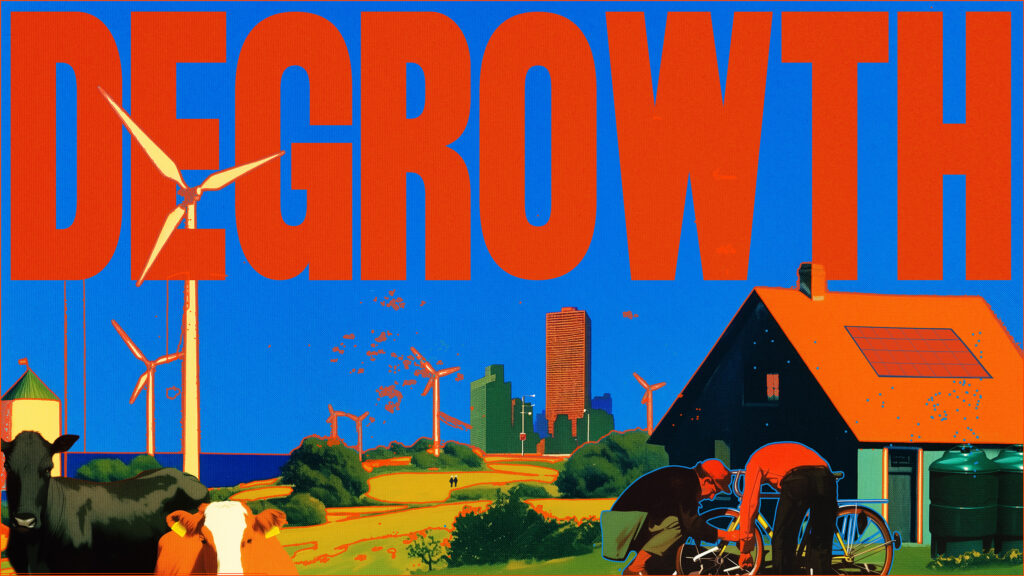What would happen if we replaced the EU’s existing economic paradigm with a new framework of reduction, sustainability, and the strategic redistribution of resources?
The degrowth paradigm presents a radical shift from this pervasive growth perspective, emphasizing the necessity of a controlled contraction of economic activity in ecologically intensive sectors, accompanied by a strategic redistribution of resources and a recalibration of well-being indicators. Proponents of degrowth, such as Giorgos Kallis, ICREA Professor at the Institute of Environmental Science and Technology of the Autonomous University of Barcelona, shares with Icarus Complex that degrowth “emphasizes the need for a planned, democratic transformation of the economic system to drastically reduce ecological impact and inequality and improve wellbeing,” challenging the fundamental assumption that economic growth is necessary or beneficial for societal well-being. Jason Hickel, economic anthropologist and author of “Less is More: How Degrowth Will Save the World,” elaborates: “Degrowth is not about reducing GDP. It’s about reducing the material and energy throughput of the economy to bring it back into balance with the living world, while at the same time redistributing existing income and resources to ensure that everyone has access to the things they need to live well.”
Advocates of degrowth argue that it offers several advantages over green growth: ecological sustainability by directly addressing the scale of economic activity, social equity through redistribution and reduction of inequalities, a focus on well-being indicators rather than GDP growth, and a cultural shift away from consumerism towards more fulfilling and less materially intensive lifestyles. Research by Julia Steinberger, Professor of Ecological Economics at the University of Lausanne, provides compelling evidence for the potential of degrowth approaches. Her work suggests that global energy use could be reduced by 60% while still providing “decent” living standards for all, challenging the assumption that high levels of consumption are necessary for well-being. However, implementing degrowth faces significant political and economic obstacles. Giorgos Kallis acknowledges these challenges, explaining that the transition to a degrowth society would require robust social safety nets and a fundamental restructuring of economic institutions. Kallis shares that “the biggest challenge for degrowth is political. It’s not about the policies themselves—we already know what needs to be done to reduce inequality and emissions. The question is how to build the broad political coalitions and mobilisations needed to dismantle entrenched power structures and implement these changes democratically.” Julia Steinberger concurs with Kallis, adding that “the main obstacles are our unequal economic and political systems that put wealth and power accumulation of major industrial actors above the existence capacities of societies and the planet. To overcome them, we have to recognize them, study them, and organize to confront them.” In short, it’s not just about reducing GDP, but about creating new systems that prioritize well-being over growth. The EU’s efforts to phase out coal power illustrate these challenges. While necessary for achieving climate goals, the closure of coal mines and power plants has led to significant economic disruption in regions heavily dependent on these industries, necessitating substantial investment in just transition measures.
“The problem of poverty is not one of scarcity, but of distribution. We already have more than enough resources to meet everyone’s needs. What we lack is equitable distribution.”
As with any paradigm shift, the idea of degrowth faces several critiques. Critics argue that economic growth is necessary to lift people out of poverty in developing countries, but proponents of degrowth, such as Jason Hickel, contend that this argument often ignores the role of redistribution: “The problem of poverty is not one of scarcity, but of distribution. We already have more than enough resources to meet everyone’s needs. What we lack is equitable distribution.” Critics of degrowth furthermore argue that moving away from a growth-oriented economy could lead to job losses and economic instability. In response, proponents argue that these approaches can actually increase economic stability by reducing dependence on unsustainable growth. Juliet Schor, Professor of Sociology at Boston College, tells Icarus Complex that “a degrowth, or post-growth transition involves shifting to shorter working hours, which can maintain employment even as the material output of the economy, and perhaps even its scale in monetary terms, is reduced. It’s about redistribution of work and resources, not just about shrinking the economy.” Nonetheless, some worry that without the profit motive driven by growth, innovation might stagnate. Mariana Mazzucato counters this view: “Innovation isn’t just about profit. Some of the most important innovations in history, from the internet to GPS, came from public sector investments motivated by societal needs, not market growth.” There are concerns about how a country or region adopting degrowth policies would fare in a global economy still focused on growth. Kate Raworth argues that this concern reflects outdated thinking: “In the 21st century, true competitiveness will come from leading the transformation to an economy that thrives within planetary boundaries. First movers in this transition will have significant advantages.”

Other skeptics of degrowth posit that these ideas are too radical to gain political traction. While acknowledging the challenges, Giorgos Kallis points out: “As the impacts of climate change and inequality become more severe, ideas once considered radical are increasingly entering mainstream discourse. The COVID-19 pandemic has already shown how quickly societies can change when there’s political will.” This skepticism towards alternative economic models echoes past debates over economic theories. For instance, ‘trickle-down economics’ argued that tax cuts for the wealthy and corporations would lead to increased investment, job creation, and overall economic growth benefiting everyone. However, decades of evidence have largely debunked this theory, showing that such policies often exacerbate inequality without significantly boosting overall economic well-being.
Even as degrowth faces severe criticisms and significant economic barriers, its potential to foster environmental sustainability, social equity, and long-term well-being remains compelling. Overcoming these challenges would require radical systemic change, political will, and a shift in societal values toward a more sustainable and just economic model.
